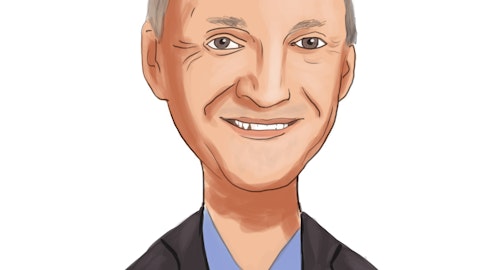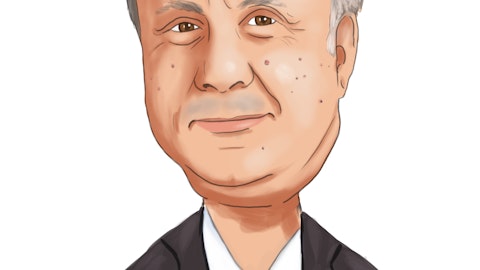Scott Bluestein: Yes. So Casey, to be clear, 30% of our fundings in the quarter were from unfunded commitments, 70% of our fundings in the quarter came from new commitments. And so I would characterize the funding activity a little bit differently than how you characterized it in the question. We think we’ve seen very healthy new deal volume. If you look at the companies that we were – the new companies that we were able to add in Q1 and the new companies that we would – that we have added in Q2, which are now in the SOI, we think these are some of the best quality debt transactions that we’ve seen over the last 10 years. These are later-stage mature scale businesses. We are very pleased by the quality and the quantity that we’re seeing. And when you look at our Q3 quarter-to-date activity, we have already closed over $200 million of new commitments and we have over $300 million of commitments that are signed and in the closing process.
Casey Alexander: All right. Great. In reference to the comments relative to Silicon Valley Bank and them being out of the market, having that sort of signpost that everybody used to run around would you say that you’ve somewhat embedded a permanent higher cost of capital for venture debt borrowers because of that lack of dominant competitor in the space?
Scott Bluestein: So two things. One, I want to be clear. We did not say that Silicon Valley Bank is out of the market. I actually specifically referenced that I think First Citizens has done a really nice job post acquisition. They’re in the market. We’re seeing them on deals. They’ve announced several transactions. We’re actually working with them on a handful of transactions. So they are certainly not out of the market. That business has fundamentally changed with what happened to Silicon Valley Bank in its legacy form in March of this year. With respect to the second part of the question, we believe the answer is absolutely yes. Historically, SVB was able to essentially drive the market down from a yield perspective, and we think that has permanently changed.
Casey Alexander: Okay. Great. That’s quite helpful. Lastly, given where the leverage ratio is and you’ve got tremendous capacity, would it be likely that over the next few quarters, we might see the ATM return to the levels that the company used to do of a 1 million or 2 million shares a quarter from what has recently been a more elevated level?
Scott Bluestein: I think it’s tough to say, Casey. I think we were pretty clear in our public marks. We are very focused on maintaining a pristine balance sheet with an abundance of liquidity. The concept that I think a lot of BDCs are struggling with is being forced to manage their business deal to deal. You spike your leverage ratio, you have to raise equity to bring it down. You’re not in the market consistently. You can’t bid on the bigger deals. We want to make sure that our team in conversations with companies and investors has the ability and has a balance sheet behind them that is pristine, that is incredibly liquid and gives us the best opportunity to continue to take market share. So I think that’s something that we’ll just continue to evaluate on a continuous basis, based on what we’re seeing in terms of pipeline and on the quality and quantity of new deals.
Casey Alexander: Fair enough. Thank you for taking my questions.
Scott Bluestein: Thanks Casey.
Operator: [Operator Instructions] Our next question comes from Christopher Nolan with Ladenburg Thalmann & Company. Christopher, go ahead with your question.
Christopher Nolan: Hey guys. Casey just asked my question. Scott, a quick question. Are you – because of your dominant position in the market, are you seeing that you have an advantage in terms and conditions and you’re able to negotiate better prepayment fees and things like that?
Scott Bluestein: I don’t think it allows us to necessarily negotiate better prepayment fees. I think it allows us to win better quality deals. We don’t have to chase some of the tougher deals that we’ve seen get done in the market. I mentioned on this call that our pipeline continues to be incredibly strong and robust. I would also mention that and I’ve said this before, we track the number of deals that get done in the market that we ended up passing on, and that continues to be at a very high level. So I think having a dominant position in the market allows us to essentially pick and choose the deals that we really want to do versus being forced to do some of the smaller tougher deals that we’re seeing getting done in the market.




